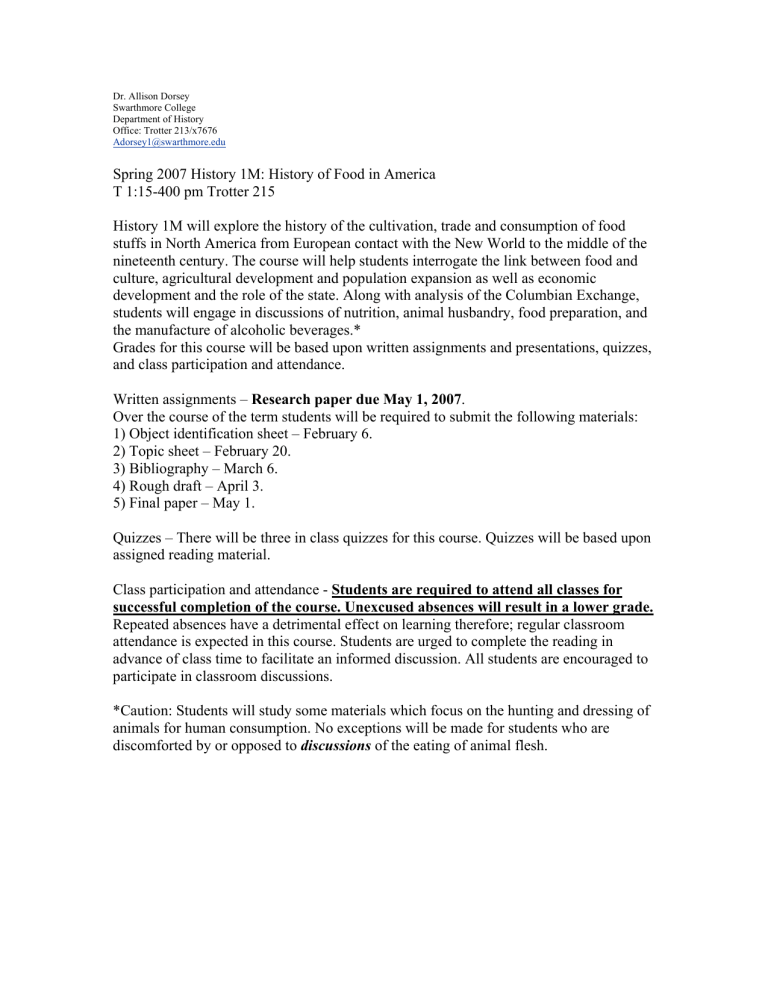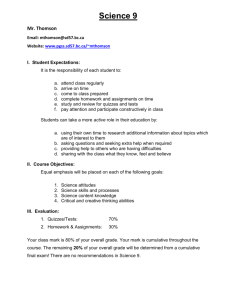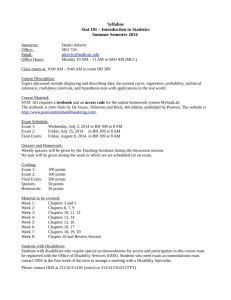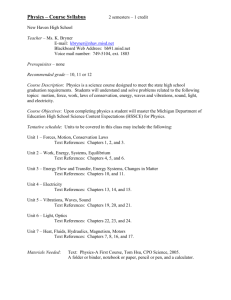Spring 2007 History 1M: History of Food in America T 1:15

Dr. Allison Dorsey
Swarthmore College
Department of History
Office: Trotter 213/x7676
Adorsey1@swarthmore.edu
Spring 2007 History 1M: History of Food in America
T 1:15-400 pm Trotter 215
History 1M will explore the history of the cultivation, trade and consumption of food stuffs in North America from European contact with the New World to the middle of the nineteenth century. The course will help students interrogate the link between food and culture, agricultural development and population expansion as well as economic development and the role of the state. Along with analysis of the Columbian Exchange, students will engage in discussions of nutrition, animal husbandry, food preparation, and the manufacture of alcoholic beverages.*
Grades for this course will be based upon written assignments and presentations, quizzes, and class participation and attendance.
Written assignments – Research paper due May 1, 2007 .
Over the course of the term students will be required to submit the following materials:
1) Object identification sheet – February 6.
2) Topic sheet – February 20.
3) Bibliography – March 6.
4) Rough draft – April 3.
5) Final paper – May 1.
Quizzes – There will be three in class quizzes for this course. Quizzes will be based upon assigned reading material.
Class participation and attendance - Students are required to attend all classes for successful completion of the course. Unexcused absences will result in a lower grade.
Repeated absences have a detrimental effect on learning therefore; regular classroom attendance is expected in this course. Students are urged to complete the reading in advance of class time to facilitate an informed discussion. All students are encouraged to participate in classroom discussions.
*Caution: Students will study some materials which focus on the hunting and dressing of animals for human consumption. No exceptions will be made for students who are discomforted by or opposed to discussions of the eating of animal flesh.
The following texts are required reading. These books are available for purchase in the bookstore and on reserve in McCabe library.
Anderson, Virginia DeJohn, Creatures of Empire
Carney, Judith, Black Rice
Kurlansky, Mark, Cod: A biography of the fish that changed the world
Mancall, Peter, Deadly medicine: Indians and alcohol in early America
Mintz, Sidney W. Sweetness and Power: The place of sugar in modern history
Nelson Foster, Linda S. Cordell Chilies to Chocolate
Stoll, Steven, Larding the Lean Earth: Soil and Society in Nineteenth Century America
Theophano, Janet, Eat My Words: Reading Women's Lives through the Cookbooks They Wrote
Warman, Arturo, Corn and Capitalism, ISBN 0807854379, University of North Carolina Press, March
2003.
The American People Volume I Nash/Jeffrey
Several articles (also required reading) are posted on Blackboard for this class:
Rachel Laudan, “Birth of the Modern Diet,” Scientific American, August 2000
Michael Pollan, “The Potato,” an excerpt from, The Botany of Desire: A Plant’s-eye view of the world
Michael Pollan, “Power Steer,” NY Times March, 31, 2002
“How to Field Dress Venison,” Michigan State University Extension
“Early Chemical leavenings,” Joy of Historical Cooking.
Peter Linebaugh and Marcus Rediker, “Wreck of the Sea-Venture” excerpted from The Many-
Headed Hydra
Stephen Nissenbaum, “Vegetarianism” & “Sex: The Pathology of Desire,” excerpted from Sex,
Diet, and Debility in Jacksonian America
Sue Shepard, “Canning,” excerpt from Pickled Potted and Canned: How Art and Science of Food
Preserving changed the world
Keith Stavely and Kathleen Fitzgerald, “The Beautiful Noble Eare,” excerpted from America’s
Founding Food
Lecture and readings schedule
Week I Orientation – What is the history of food and why study it?
Reading: “Birth of the Modern Diet”
Week II The Columbian Exchange
What was here? What were the “discoverers” seeking?
What did they bring?
Reading: “The Wreck of the Sea-Venture”
“This Beautiful Noble Eare”
The American People, Chapters 1 & 2
Week III Sugar is bittersweet
The slavery and changing European diets
Reading: Sweetness and Power
Week IV Out of Africa
Food and Culture of the “forced” migrants
Reading: Rice
Week V Feeding the “City on the Hill”
Agriculture among the Pilgrims and Puritans
Reading: Creatures of Empire
Week VI From “noble savages” to the “Indian Problem”
First encounter “fire water”
Week VII Harvesting the bounty of the sea
Fishing, Whaling and the maritime industry
Week VIII Stay or “Go West”?
The challenge of land use and lure of western expansion
Reading: Larding the Lean Earth
Week IX
“How to Field Dress Venison”
This har’ is cattle country!
Replacing the Indians with cowboys
Excerpt from North American Cattle Ranching Frontiers
Week X Bread – the staff of life production Americas
Reading: Corn and Capitalism
Chilies to Chocolate, Chapter 2, 9
“Early Chemical Leavening,” Part I & II
Week XI “Nothing with a face”
19 th
century vegetarianism/social reform through diet
Reading: Sex, Diet and Debility in Jacksonian America
Chapters 1 & 3
Week XII Soup from a can – fancy that!
Modern food preservation
Reading: “Canning,” in Pickled, Pitted and Canned
Week XIII “A Woman’s work is never done”
Who’s at the stove? And what are they cooking?
Reading: Eat My Words.
Week XIV CLASS PRESENTATIONS






